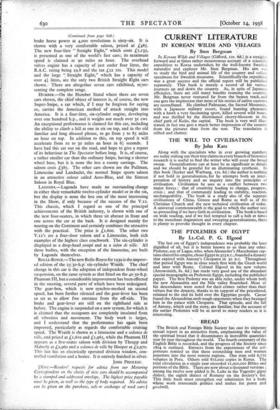Along with the specialists who in ever growing numbers are
today staking out their tiny claims in every branch of historical research it is useful to find the writer who will essay the broad sweep. Generalisations can at least be as significant as details and we should be grateful for an illuminating synthesis. In this book (Seeker and Warburg, its. 6d.) the author is nothing if not bold in generalisation, for he attempts both an inter- pretation of history and an inquiry into the principles of civilisation. Civilisation he sees as a conflict between two major forces : that of creativity leading to change, progress,
crisis; that of community leading to stability, reaction, unchangeability. The book is a study also of the separate civilisations of China, Greece and Rome as well as of the Christian Church and the new technical civilisation of today. A universal comnionwealth is- the goal to which the author sees us proceeding if we have faith in civilisation. The book is based on wide reading, and if we' feel tempted to call a halt at times to the trenchant dogmatism and sweeping generalisations, there is plenty to provoke thought in every chapter.


















































 Previous page
Previous page